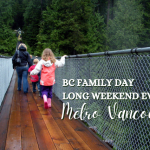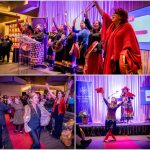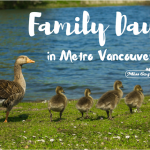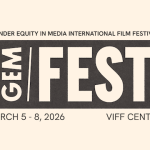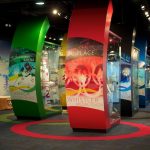Cuso International Volunteer Q&A
This winter I have been sharing stories about the Cuso CAN Fund, which supports Cuso International’s high priority maternal and child health projects in Ethiopia, Benin, Nigeria, Tanzania and the Democratic Republic of Congo. Behind these stories are some amazing local women who have volunteered with Cuso over the years, like Maggie Woo Kinshella of Vancouver. I had the opportunity to do a Q&A with Maggie to learn more about her time with Cuso.

Q1. How did you get involved with Cuso?
Maggie: It’s a bit of a long story how I got in contact with Cuso International. My dad talked about his friend going on a Cuso International placement and himself applying when he was younger but ultimately timing didn’t work out for him. Consequently, Cuso International was something on my mind. A couple years ago, the timing for me aligned. My husband Bryan and I had just come home from our extended honeymoon where we cycled from Vancouver to Buenos Aires, Argentina to raise awareness and funding for gender equality and health programs in Western Kenya. I had just graduated from my masters in medical anthropology in global health before the trip so I had skills I could offer. I had been working as an independent research consultant in the Downtown Eastside with mental health, homelessness and addiction, which is a very amazing field but I wanted to get back to gender and global health, which is a passion for me.
Cuso International, as a long established volunteer organization in Canada and one that focuses on community partnerships and capacity building, was an obvious choice for me. Its philosophies of working closely with local people in the heart of communities, through local organization, matched my own.
Q2. You helped train promotion officers and health program supervisors, what was this process like for you? How did you prepare for it?
Maggie: Because the work is so driven by what is needed locally and done in close collaboration with local partners, there is always room for the unexpected. The position description was quite vague on exactly what the job entailed. The manager I worked with at the Benishangul Gumuz, a very inspirational young leader determined to make a difference in an undeserved area, had slightly different priorities than the previous manager who developed my job description. While I had some general ideas before I arrived in Assosa Town, I didn’t exactly know what I was going to be doing. Consequently, volunteers need to have skills to offer but I think the best way to prepare is to keep an open mind and to keep expectations flexible.
 As a technical advisor, I am there as a catalyst, to build momentum for change and to collect, refine and assist in actualizing their initiatives. In the six months I was there, I worked closely with the health promotion officer, the health extension worker officer, child health officer, maternal health office and other members of the Regional Health Bureau. We began with interviewing staff and facility management at different levels of care including hospital level, urban health centre and rural health center to better understand what health education activities were being conducted and what were the key strengths and challenges. Afterwards, we conducted training workshops tailored to the needs of Benishangul Gumuz, including a focus on participatory learning methods and reaching the indigenous communities in the state.
As a technical advisor, I am there as a catalyst, to build momentum for change and to collect, refine and assist in actualizing their initiatives. In the six months I was there, I worked closely with the health promotion officer, the health extension worker officer, child health officer, maternal health office and other members of the Regional Health Bureau. We began with interviewing staff and facility management at different levels of care including hospital level, urban health centre and rural health center to better understand what health education activities were being conducted and what were the key strengths and challenges. Afterwards, we conducted training workshops tailored to the needs of Benishangul Gumuz, including a focus on participatory learning methods and reaching the indigenous communities in the state.
Training was conducted for all of the health education officers in each of the districts of the state as well as all of the health center heads and supervisors of the whole region. Because these training sessions gathered key people, it was also an opportunity to discuss success stories and gaps and brainstorm the way forward for health education programming in the region. Next came research when a small team and I conducted focus group discussions and key informant interviews with health extension workers from communities representing four different local indigenous groups. We used the research to make a health education package tailored for Benishangul Gumuz as well as a reproductive health campaign that used local faces and real quotes from real people. Before I left, the Regional Health Bureau was already starting to use some of the material for a Breastfeeding campaign.
Q3. What are some of the biggest challenges facing expectant & new mothers in Ethiopia?
Maggie: Some of the biggest challenges facing expectant and new mothers in Ethiopia…this is a big question. It is a combination of health infrastructure gaps and poor quality of care at facilities that are seen in many resource poor health systems. Poverty and large distances with a lack of transport options also make it hard to access health. These challenges all came together in the story of Fatuma I shared on my blog of a woman who almost died from pre-eclampsia and resulting eclamptic seizures. Gaps in awareness, especially about pre-eclampsia, which is characterized by hypertension in pregnancy, combined with challenges accessing health services like long distances and medication costs and severe limitations of health care facilities all contribute to dangerous situations for women in Ethiopia. Today, I work in global research project with pre-eclampsia (see CLIP for more information).
Q4. Is there anything specifically that you would really like Canadians to know about Cuso and mother/baby health in these other regions?
Maggie: Many maternal and child deaths in low and middle income countries are preventable. Things are changing but not fast enough for many women. Together, we can make a difference and through organizations such as Cuso International, everyday Canadians are making an impact on global health and other areas of development. Volunteering is an amazing opportunity to learn more about the world and also to learn more about oneself as well. I think building more understanding and connection around the world on a personal level is something our world today really needs.
As a side note, a really incredible story happened just this morning. I still talk to many of my colleagues in Ethiopia regularly, which made this possible. A little while ago, a woman contacted me out of the blue asking for photos of Assosa for her adopted daughter. She asked me if by any chance I knew her birth mother, who’s from Assosa and once had her number but had lost contact over the years. I said I would look into it. This morning, defying all odds, we are one step closer to finding the little girl’s birth mom! One of my friends in Assosa was able to get in touch with the birth mom’s family. It felt like the plot of a movie or something to me. It was just so incredible.
Support Cuso International
You can support the Cuso CAN Fund through monthly gifts, which will ignite a chain reaction of positive change that starts with healthy moms and babies, and ends with thriving families and communities. To learn more, follow Cuso International on Facebook and Twitter.




